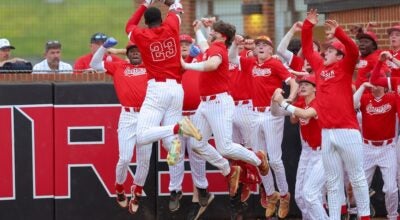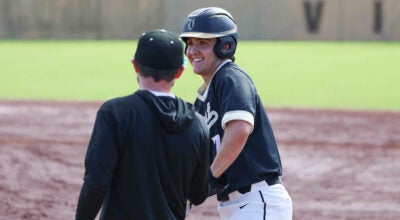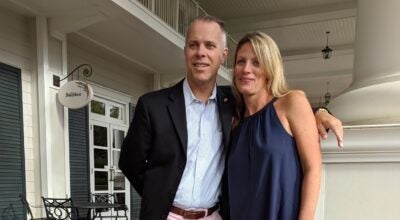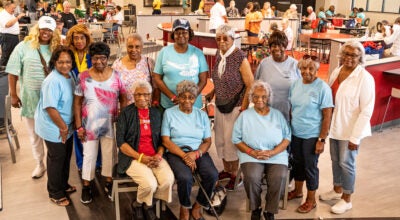Global impact: Copes, students remote teach Honduran class
Published 10:40 am Monday, November 12, 2018
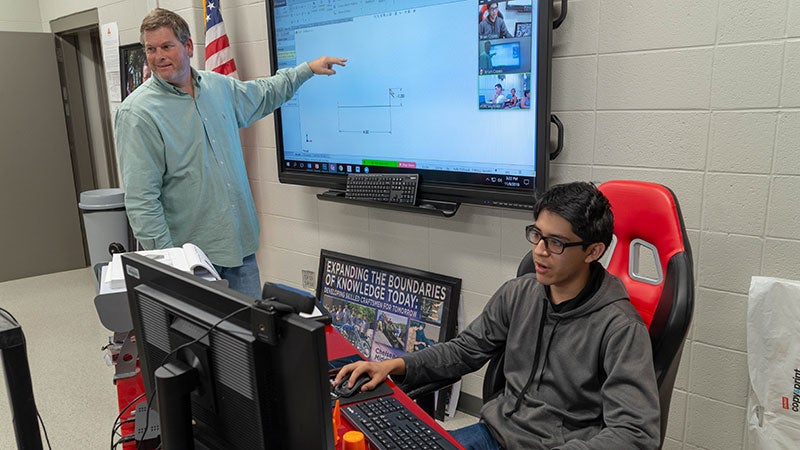
- Thompson High School engineering teacher Brian Copes, left, leads a remote lesson with Yuri Martinez’ class in Honduras as THS student Leonardo Hernandez, right, translates for him. (Reporter Photo/Neal Wagner)
By NEAL WAGNER / Managing Editor
ALABASTER – As with many of his classes at Thompson High School, engineering teacher Brian Copes stood in front of a large TV displaying the Solidworks design software on Nov. 8 as he took students step-by-step through the process of modeling a 3D object.
“I got the models you did, and they were excellent,” Copes said of the students’ work from a few days prior. “I’m very proud of you.”
On a laptop screen in front of Copes, several students smile as THS sophomore Leonardo Hernandez translates Copes’ words.
While Copes is taking the same steps he would for any of his beginning engineering classes, this one is different. Rather than having a classroom full of students filling his classroom, he is addressing a group of students several thousand miles away in a developing country.
Through Copes’ Global Sister Schools program, he, Hernandez and fellow THS 10th-grader James Bazan have been staying after school a couple of days a week for the past few months to hold video conferences with Yuri Martinez’ class in Honduras.
Martinez’ class, which is piloting the Global Sister Schools program with Copes, meets in one of the container classrooms built by Alabama schools and shipped to Central America, and is connected with Copes via web cameras.
During each one of the remote classes, Copes demonstrates engineering principals while Hernandez translates the lessons into Spanish and translates Martinez’ students’ comments to Copes.
“It’s a tiny bit stressful,” Hernandez said of serving as intermediary between Copes and the Honduran students. “At the beginning of the year, the vocabulary I had didn’t include the engineering terms, so I learned them. It’s gotten a lot easier since then.”
During each class, Bazan records and edits the footage to share with other schools interested in becoming involved in the Sister Schools program.
“We don’t need a lot of money or experience to make a difference. You don’t have to have all these qualifications to help people, and that’s the coolest part of it to me,” Bazan said. “I can see the relationships we have built (with Martinez’ class). Now, they’re like family.”
On the afternoon of Nov. 8, Copes was conducting his final remote lesson with Martinez’ class before the students went on their equivalency of summer break, which coincides with the Honduran rainy season. In only 40 minutes, the students had designed from scratch a 3D part to add to the semester-long building project they have been working on.
For Martinez’ students, having an opportunity to learn from Copes is life-altering.
“This is not something we would normally have a chance to do in Honduras,” the class members said as Hernandez translated. “This could help us in so many ways, even in construction. Knowledge is something you can never get enough of.
“We are very grateful to be the first group in Honduras to have the opportunity to take a 3D modeling class,” they said. “It’s like hands-on training from thousands of miles away.”


